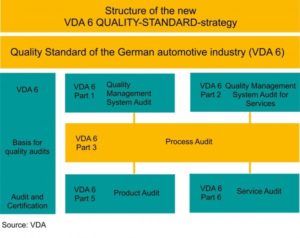With over 250 automotive manufacturers and associated suppliers calling South Carolina home, it is important that increasing customer demands be understood as a means of maintaining a competitive advantage.
Not only are the requirements for implementing various ISO standards on the rise once again, we are also seeing an increasing demand for the adoption of sector-specific standards, tools and guidance documents – especially within the automotive supply chain. AIAG Core Tools (SPC, FMEA, APQP, PPAP, MSA) and VDA 6.3 have been requests noticeably on the rise over the past year.
While resources for training Core Tools seems to be plentiful, VDA 6.3 seems to be a new standard with few experts and limited understanding by companies in the southeastern US. As a firm specializing in quality and advanced manufacturing, we are seeing a dramatic increase in the request for training and implementation of VDA 6.3.
What is VDA?
VDA (Verband der Deutschen Automobilindustrie) is the German trade association for the automotive industry, similar to AIAG (Automotive Industry Action Group) here in the US. In 1997, VDA set up a Quality Management Centre (QMC) in order to develop systems and methods to define quality management system requirements in the automotive industry specifically for the benefit of automotive German OEM’s and their suppliers.
What is VDA 6.3?
VDA 6.3 (or VDA 6, “Part 3” is a process-based audit standard used to evaluate and improve controls in manufacturing operations. In 2010, this standard was restructured to incorporate customer-specific requirements from each major German OEMs. While ISO/TS 16949 contains a requirement to conduct manufacturing process audits, the requirement is vague and doesn’t provide any detail on how these process audits are to be conducted.
 ISO/TS 16949:2009, clause 8.2.2.2 Manufacturing process audit – “The organization shall audit each manufacturing process to determine its effectiveness.”
ISO/TS 16949:2009, clause 8.2.2.2 Manufacturing process audit – “The organization shall audit each manufacturing process to determine its effectiveness.”
VDA 6.3 contains various modules such as requirements for auditing assembly operations and various stages along the product’s life cycle. VDA 6.3 also contains specific certification requirements (pre-requisites and training) as well as an exam in order to be deemed qualified as an auditor.
How does VDA 6.3 improve operations?
VDA 6.3 is intended to impact manufacturing operations from product development and analysis of production and suppliers’ processing to customer assistance and satisfaction. While pushing for continual improvement, VDA 6.3 drives organizations with a focus on these three key aspects of the manufacturing process:
- 5S (sort, set in order, shine, standardize, and sustain): VDA drives organizations to organize a work space for efficiency and effectiveness by identifying and storing the items used, maintaining the area and items, and sustaining the idea work environment.
- Controls in Manufacturing: Most OEM’s consider themselves to be “torque companies” who spend more of their value-added processing time on assembly than actual manufacturing. VDA defines methods for ensuring proper clamp load design and torque control. Critical torque operations require equipment with certain features to ensure torque is being applied as expected. Post operation torque/clamp load audits are often times required to ensure operational control, gauge control and inspection plans are being completed as expected by the customer.
- Best-in-Class Methodology: Having proper manufacturing methods and procedures, and performing according to these best practices, is also an expectation of VDA 6.3. Organization need to ask the questions such as:
- Are we using a best-in-class method to perform each operational process step?
- How is the competition doing?
- What is the plan to surpass the competition on these best-in-class processes?
- What is the plan to reach the entitlement (ultimate result) within each operational process?
Why is this methodology gaining momentum?
German-based manufacturing OEMs and their suppliers were the first to emerge from the 2008-2011 global economic downturn. German manufacturers have had a long history of being amongst the leader globally in advanced manufacturing techniques, quality standards and other organizational excellence initiative (i.e. safety, energy efficiency, etc.). Per capita, Germany hold the most Quality Management System (QMS) certifications amongst any of the 140+ countries who participate in ISO 9001 and ISO/TS 16949 certifications.
With two of the world’s leading German automotive OEMs – BMW and Daimler (Mercedes-Benz Vans) – expanding their operations in our state, suppliers eager to serve these customers must understand increasing requirements and the associated benefits to cost and risk reduction that this emerging standard provides. In order to compete, VDA 6.3 must be understood and deployed correctly. If deployed correctly, end customers, OEMs and suppliers should experience less warranty incidents and improved operational efficiency – ultimately leading to lower cost and higher quality vehicles.
For further questions about VDA 6.3 and or other emerging standards in the automotive or aerospace supply chain, contact us at info@concentricglobal.co.
ABOUT THE AUTHORS
JIM THOMPSON: A Management System expert specializing in automotive manufacturing process improvements, Jim has over 20 years of experience serving domestic and international organizations in their pursuit of excellence.
In 2003, Jim founded Concentric Management Systems, Inc. in order to serve the training, consultation and assessment needs of his clients, specializing in ISO 9001, ISO/TS 16949 and AIAG core tool implementation. In 2008, Jim relocated his business operations to Charleston, SC. Jim is an Exemplar Global Accredited QMS Lead Auditor.
SIDNEY PORTO: A results-oriented leader with solid background in Operations & Engineering. Sidney has been head of quality, manufacturing engineering, shop operations, safety, environmental, facilities & equipment maintenance, product and applications engineering during 25-year carrier in the automotive industry. Sidney is experienced in project management, six sigma methodology, product and process design / validation / implementation / improvement, cost reduction, and meeting deadlines consistently.
He is skilled in leadership, management systems implementation & maintenance, problem solving techniques and effective communication. Values teamwork and builds productive working relationships providing proper response to customers’ needs. Sidney is DNV certified QMS lead auditor and has successfully led management systems towards ISO 9001, ISO/TS 16949, ISO 14001, ISO 45001, Ford Q1 and VW VDA class A.


Be the first to comment on "Why is VDA 6.3 on the rise and why should SC manufacturers care?"